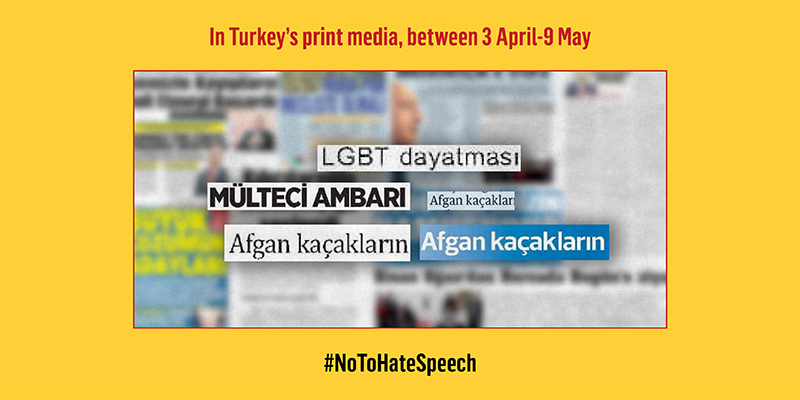Prior to the elections of May 14th, we reviewed the print media coverage that included the statements of politicians by using certain keywords. As a result of this survey, which covered the dates of April 3 to May 9 2023, we found that discriminatory discourse and hate speech were used in some of those statements. We analyzed how these statements were covered in the national and local press.
In 11 of the 21,355 news items published between these dates, the media outlets have reproduced* the hate speech in the expressions of politicians targeting ethnic, religious and national identities, sexual identities and orientations; and produced discriminatory discourse in 173 news items.
30% of the discriminatory discourse and hate speech content that we detected were published in national newspapers and 70% in local newspapers. We observe different results of distribution of hate speech content depending on national and local newspapers. Because local newspapers are in direct touch with their audience where they are published. Since the news and articles in local newspapers are in direct touch with the readers, the hate speech content in these newspapers can be more influential on the daily lives of the readers.1
- 126 of the 184 news items that contain discriminatory discourse and hate speech cover the statements of politicians about immigrants and refugees. In 19 of the 28 news items that included the statements on immigrants and refugees, we observed that refugees were handled as a security problem and that the common misconceptions about refugees were reproduced*. Refugees were targeted again in six of the news stories in which the aforementioned statements were covered without quotation marks.
- 16 of the 184 news articles containing discriminatory discourse and hate speech focused on statements on Afghan refugees' irregular migration to Turkey. In two of those, expressions containing hate speech of the politicians were reproduced through statements that were quoted without quotation marks. In these analyzed examples, the Afghan identity was described as 'fugitive' and targeted with negative adjectives. Existing prejudices against Afghans were reinforced by creating the perception that Afghan identity is a potential threat.
- 36 of the 184 news articles containing discriminatory discourse and hate speech were about the discourses of politicians about LGBTI+s. In four of those, there were politicians' statements consisting of hate speech towards LGBTI+s and hate speech was regenerated by not using quotation marks. Based on the analyzed news articles, LGBTI+s were targeted with negative adjectives such as 'imposition,' 'deviant,' and 'pervert.' In addition, it was argued that LGBTI+s 'posed a threat' to 'children, family, and society'.
Of the analyzed hate speech news items, 55% were classified under the category of swearing /insult/defamation; 36% were in the category of exaggeration/attribution/distortion, and 9% were in the category of hostility/war discourse.
In these analyzed examples, we observe discriminatory discourse produced against immigrants, refugees, and various identities, chiefly LGBTI+s, during the election. We believe that discriminatory discourse in critical periods such as elections will further increase the polarization in society; therefore, we believe that the media and politicians should use more inclusive language. We hope that this study, like other examples, will draw attention to the role of the media in the production of hate speech, contribute to the production of an inclusive discourse free from discrimination, and the importance of coexistence.
*In expressions that are covered without using quotation marks, the authors acknowledge the discourse in question, since they fail to approach the discourse in the statement from a critical standpoint. Without the quotation marks, expressions containing discriminatory discourse and hate speech are reproduced.
1 Az, İ., Ensari, P., & Özkan, Ş., (2021). "Hate speech in Turkish print media: Data of the decade", ed. Altuğ Yılmaz, in Media and Hate Speech - II (109). İstanbul: Hrant Dink Foundation Pub.

This project is financed by the European Union.


